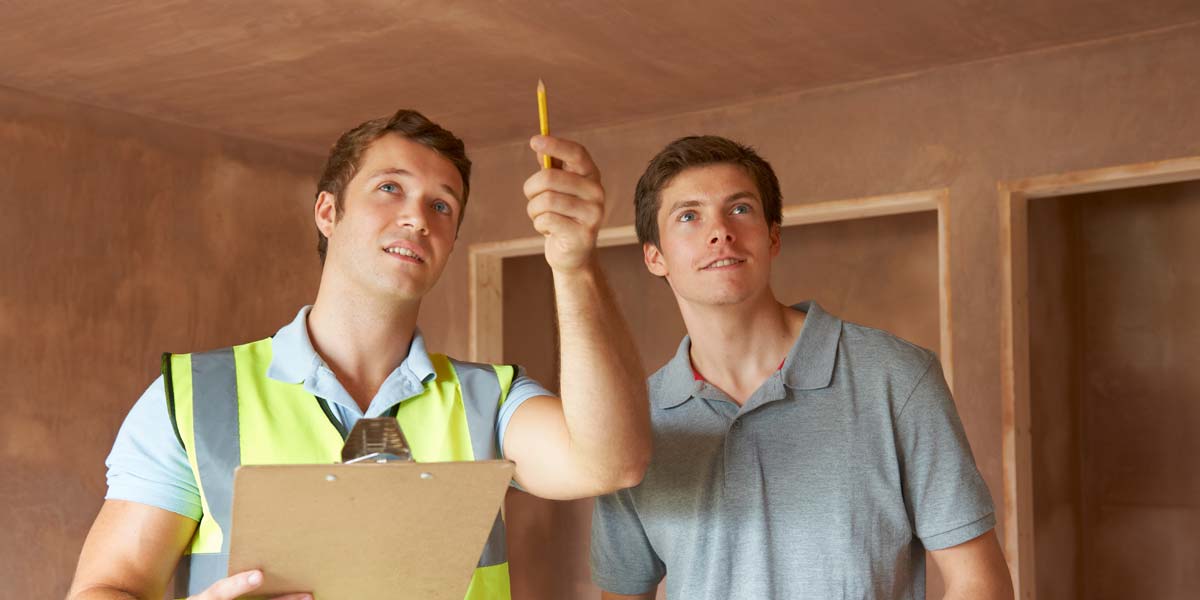
You’re excited to move into your new home, and see you have an email in your inbox from the home inspector. You open the attachment and see a long list of items that the inspector flagged — from chipped paint on a door frame to mold in the basement or crawlspace. How are you expected to wade through the list and figure out what repairs are needed, what you can handle yourself and which can wait?
We spoke with the experts at Clever Real Estate, InterNACHI, HomeLight and Long & Foster Real Estate to put together a list of the most common repairs needed after a home inspection.
While there is no obligation to make fixes, there are two instances where the seller would be highly motivated to make repairs in order for a sale to happen: when the law requires a fix and when a buyer’s lending partner requires a fix.
According to Nick Gromicko of InterNACHI, repairs required by law vary by location. So, laws that require a septic tank to be repaired in a Midwest state may not apply to a state on the West Coast. Additionally, each bank or lender will have their own priorities when it comes to what they want fixed. While these repairs required by a lender are not required by law, denying the fixes may cause the buyer to not receive financing, effectively cancelling the home sale.

“’Mandatory’ fixes from a legal perspective are tied to occupant health and safety. If the home is considered safe for occupancy, however, then it’s no longer a question of whether the repairs are required by law, but instead whether the buyer feels comfortable moving forward with the home in its current condition.”
Amber Taufen | HomeLight
Keep in mind that the seller is under no obligation to make any fixes prior to the sale, as they already have a signed contract. However, most of these contracts are written in a way that allows the buyer to walk away following the inspection if they are not satisfied with the results, giving the seller motivation to be reasonable with fixes.
It’s time to decide what to ask the seller to fix. There’s a lot to go through, but according to Tommy O’Shaughnessy with Clever Real Estate, you should immediately scratch off anything that is cosmetic or small-scale.

“Small fixes are rarely worth bringing to the bargaining table, especially in a competitive sellers’ market where the seller can reject your counter and move on to someone who will buy the property as-is. Instead, focus on the big-ticket items.”
Tommy O'Shaughnessy | Clever Real Estate
With that in mind, here are some reasonable requests that our experts said sellers should expect to see after home inspection.

Electrical hazards are common on home inspection reports. That’s because something as simple as a burned-out light bulb will be flagged. The reason electrical deficiencies pop up so frequently is simple: humans depend on electronics to survive. “Think about how many more appliances and electronics we’re running on our homes today than in previous decades,” said Amber Taufen, Managing Editor at HomeLight. “We have more computers, televisions and stereo systems than ever before, which requires more electrical infrastructure to support it all.”
The key is knowing the difference between big problems and minor repairs. If these items were noted on your home inspection report, consider asking they be fixed by a licensed contractor:

“The best advice would be to have a reputable, licensed electrician to inspect the repair request. A good electrician will know all current codes and be able to recommend the best solutions to protect both buyer and seller.”
Deborah Harari | Long & Foster Real Estate

The system that heats and cools your home is one of the big-ticket items you’ll want to ask about. Keep in mind that it should be big things you ask for. Don’t worry about a dirty filter or a duct cleaning. Instead, ask for repairs if there are leaks in gas or water lines or the exhaust flue, clogged or dirty condenser parts, or electrical concerns that cause a safety hazard.
Pro-Tip: Many warranties on HVAC systems, hot water tanks and appliances are transferrable, so be sure to ask the seller for the warranty information.

Mold presents a health concern and remediation is a reasonable request following a home inspection. Keep in mind that mold can grow pretty much anywhere in a home, and that an inspector can only confirm its presence in visible areas. For other areas they will note where there is a concern, but they may not actually have any issues.
As for water damage, you’ll want to ask for major issues to be repaired. Cosmetic fixes like small stains from a leaky toilet or a warped vanity cabinet door aren’t things you should bring to the seller’s attention. Walls and ceilings that are wet to the touch or show major signs of previous water issues are problems you should ask the seller about and then decide on repairs. These issues may also be noted on disclosure paperwork, which can help give you a better understanding of the problem.

“Ask if there have been any issues with water. You can never ask enough questions. Trust the professionals and have the inspections. Be present at all of these and ask more questions. This is the most expensive purchase you will ever make, take the time and research it.”
Deborah Harari | Long & Foster Real Estate

If you look hard enough, you’ll find plumbing issues with nearly any home. However, not every issue is something you need to worry about when it’s flagged on the inspection. A leaky faucet or slow drain aren’t things to fuss about. Instead, you’ll want to request rusted pipes be replaced with PVC, cross-connection issues and other code violations fixed and any significant hot water and septic tank issues remedied.

“Is the plumbing PVC or cast iron? These are capital expenditures homeowners need to consider when buying a home. This is why an inspection contingency is so important. Your inspector can find issues and help you get repairs.”
Tommy O'Shaughnessy | Clever Real Estate

Roofing issues can quickly become expensive, which is why buyers commonly ask they be repaired after a home inspection. It can also be one of the trickiest repairs to navigate. There are certain loan types that require a specific standard of repairs, forcing the buyer to potentially ask for more than the seller is willing to do.
The other reason this can be tricky is that the roof may not be actively leaking at the time of inspection. If that’s the case, the inspector will note water damage that is potentially a result of a faulty roof. Even without the solid evidence, roof repairs merit further inspection.

If the inspector flags any concerns about the structure’s safety, always ask that those items be repaired. For Gromicko, structural issues tick all of the boxes that require repair. “There are three things that are important to ask for repairs on: major defects, conditions that can lead to something getting worse and safety issues.”
If the home inspector notes bowing walls, sagging ceilings or significant cracks in the walls, ceilings, doorframes or foundation, put those items at the top of your list for repair requests.

“If there is a health or safety concern, that should always be dealt with before settlement. Everything else really needs to be a personal choice and what is the highest priority to them as new homeowners.”
Deborah Harari | Long & Foster Real Estate
The seller will always pay for repairs, but how that payment occurs can vary in the form of repairs completed by the seller, credit owed to the buyer or a reduction in sale price. Gromicko suggests that asking for a credit is the best route to go: “If you ask for repairs to be made, the seller can make them as cheap as possible, accepting the lowest bids, using an unqualified handyman or even trying to do the work themselves. With a credit, you save the money on closing costs that you can then use to fix the issues with a handyman or company you trust.”
Keep in mind that this is a bargaining process and the seller is under no obligation to make any repairs. If they feel the repairs are too much, they are within their rights to counter with fewer items or even cancel the sale.
A recent study that analyzed more than 50,000 home inspection reports found that the average price per repair is about $500. It also found that each home had about 20 items that needed fixed, bringing the average total repairs to about $10,000.
Looking at a home inspection report can be overwhelming. It may seem like every little thing is flagged and that there is a lot wrong with the home. The thing to keep in mind is that the vast majority of the items are aesthetic and minor issues that shouldn’t deter you from making the house your dream home.
Now that you know the most common repairs found in a home inspection, don’t shy away from requesting them.
Recommended Reading: The Ultimate Moving Checklist, What to Get Rid of Before a Move, How to Move Heavy Furniture, What to Know After You Move
